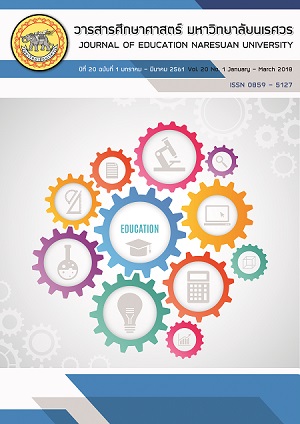การพัฒนารูปแบบภาวะผู้นำเชิงกลยุทธ์ที่มีประสิทธิผล ของผู้บริหารสถานศึกษาขั้นพื้นฐาน; THE DEVELOPMENT OF AN EFFECTIVE STRATEGIC LEADERSHIP MODEL FOR ADMINISTRATORS IN BASIC EDUCATION SCHOOLS
Main Article Content
Abstract
การวิจัยครั้งนี้มีวัตถุประสงค์ คือ 1) ศึกษาองค์ประกอบของรูปแบบภาวะผู้นำเชิงกลยุทธ์ที่มีประสิทธิผลของผู้บริหารสถานศึกษาขั้นพื้นฐาน 2) พัฒนารูปแบบภาวะผู้นำเชิงกลยุทธ์ที่มีประสิทธิผลของผู้บริหารสถานศึกษาขั้นพื้นฐาน 3) ประเมินประสิทธิผลของรูปแบบภาวะผู้นำเชิงกลยุทธ์ที่มีประสิทธิผลของผู้บริหารสถานศึกษาขั้นพื้นฐาน โดยดำเนินการวิจัย 3 ขั้นตอน ดังนี้ ขั้นตอนที่ 1 ศึกษาเอกสาร แนวคิด ทฤษฎี และสัมภาษณ์ผู้ทรงคุณวุฒิจำนวน 5 คน ขั้นตอนที่ 2 พัฒนารูปแบบภาวะผู้นำเชิงกลยุทธ์ที่มีประสิทธิผลของผู้บริหารสถานศึกษาขั้นพื้นฐาน โดยใช้เทคนิคเดลฟาย 3 รอบ สอบถามผู้ทรงคุณวุฒิ จำนวน 17 คน ขั้นตอนที่ 3 ประเมินประสิทธิผลของรูปแบบภาวะผู้นำเชิงกลยุทธ์ที่มีประสิทธิผลของผู้บริหารสถานศึกษาขั้นพื้นฐาน โดยใช้เป็นแบบสอบถามความคิดเห็นชนิดมาตราส่วนประมาณค่า 5 ระดับ สอบถามผู้บริหารสถานศึกษาขั้นพื้นฐานที่เป็นกลุ่มตัวอย่าง จำนวน 380 คน สถิติที่ใช้ในการวิเคราะห์ข้อมูล ได้แก่ ความถี่ ร้อยละ ค่าเฉลี่ย ส่วนเบี่ยงเบนมาตรฐาน ค่ามัธยฐาน และค่าพิสัยระหว่างควอไทล์ ผลการวิจัย พบว่า
1. ภาวะผู้นำเชิงกลยุทธ์ที่มีประสิทธิผลของผู้บริหารสถานศึกษาขั้นพื้นฐาน ประกอบด้วย 10 องค์ประกอบ ได้แก่ 1) การคิดวิเคราะห์เชิงเหตุผล ประกอบด้วย การใช้เหตุผล การเชื่อมโยงความรู้ และไหวพริบปฏิภาณในการแก้ปัญหา 2) การตัดสินใจ ประกอบด้วย การระบุสาเหตุของปัญหา และการเลือกทางเลือก 3) การวิเคราะห์สภาพแวดล้อม ประกอบด้วย การวิเคราะห์โครงสร้างสถานศึกษา และการวิเคราะห์ จุดอ่อน จุดแข็ง โอกาส และอุปสรรค 4) การกำหนดวิสัยทัศน์ ประกอบด้วย การกำหนดวิสัยทัศน์ พันธกิจ และเป้าประสงค์ 5) การบริหารเชิงกลยุทธ์ ประกอบด้วย การกำหนดกลยุทธ์ นำกลยุทธ์ไปปฏิบัติ ควบคุมและประเมินกลยุทธ์ 6) การบริหารทรัพยากรในองค์การ ประกอบด้วย การจัดสรรเงินงบประมาณ และจัดการทรัพยากรที่มีจำกัดให้คุ้มค่า 7) การบริหารการเปลี่ยนแปลง ประกอบด้วย การเตรียมความพร้อม และการวางระบบบริหารให้สอดคล้องกับการเปลี่ยนแปลง 8) การทำงานเป็นทีมและการมีส่วนร่วม ประกอบด้วย การสร้างทีมงานที่มีประสิทธิภาพ การสร้างสัมพันธ์ภาพที่ดีระหว่างผู้ร่วมงาน การสร้างขวัญกำลังใจและความพึงพอใจแก่สมาชิก 9) การพัฒนาบุคลากรในองค์การ ประกอบด้วย การพัฒนาบุคลากร และการมอบหมายงานอย่างเหมาะสม และ 10) การสร้างวัฒนธรรมองค์การ ประกอบด้วย การบริหารงานด้วยหลักธรรมาภิบาล การสร้างความศรัทธาเชื่อถือ และค่านิยมที่พึงประสงค์
2. รูปแบบภาวะผู้นำเชิงกลยุทธ์ที่มีประสิทธิผลของผู้บริหารสถานศึกษาขั้นพื้นฐาน ผู้บริหารสถานศึกษาขั้นพื้นฐานประเมินประสิทธิผลอยู่ในระดับมากทุกองค์ประกอบ
THE DEVELOPMENT OF AN EFFECTIVE STRATEGIC LEADERSHIP MODEL FOR ADMINISTRATORS IN BASIC EDUCATION SCHOOLS
The objectives of this research were threefold: 1) to study strategic leadership components of effective administrators in the basic education schools, 2) to develop the strategic leadership model for effective administrators in the basic education schools, and 3) to evaluate the strategic leadership model for effective administrators in the basic education schools. The study procedure followed 3 steps: 1) to review the strategic leadership components literature by documentary analysis and to interview 5 educational experts, 2) to develop the strategic leadership model by conducting the 3 –round confirmatory Delphi technique with 17 experts on strategic leadership model, and 3) to evaluate the model by using a five-rating scale questionnaire survey with a sample of selected 380 administrators of basic education schools. Statistics employed for data analysis were frequency, percentage, mean, standard deviation, median and inter-quartile range.
The research results were as followed;
1. The strategic leadership components for effective administrators in the basic education schools consisted of 10 components namely: 1) logical analytical thinking including: reasoning, linking Knowledge and Intellectual problem solving, 2) decision making including: identifying the cause of the problem and Choosing the choices, 3) environment analysis including: organizational structure analysis and SWOT analysis, 4) vision determination including: determining vision, mission and goal, 5) strategic management including: determining strategies, strategy implementation, controlling and evaluating strategy, 6) organizational resources management including:budgets management and limited resources worthy management, 7) change management including: preparedness and management system in accordance with the changes ,8) teamwork and participation including: creating an effective team, Creating relationship, morale and satisfaction, 9) personnel management including: human resource development and assignments properly, and 10) creating organization culture including: administration with good governance principles, creating faith and desirable values.
2. The strategic leadership model as evaluated by the administrators of the basic education schools was rated at high level of all components.
Article Details
The owner of the article does not copy or violate any of its copyright. If any copyright infringement occurs or prosecution, in any case, the Editorial Board is not involved in all the rights to the owner of the article to be performed.
References
Anannawee, P. (2012). Principles, theories of educational administration (4th ed.). Bangkok: Montri. (in Thai)
Bass, E. M., & Stogdill, R. M. (1990). Bass and Stogdill’s handbook of leadership: Theory research, and managerial applications (3rded.). Columbus, Ohio: Collegiate.
Betty, S. W. (2005). A lesson in strategic leadership for service. Nurse Leader, 3(5), 25.
Bunyajitradulya, N. (1991). Principles of Education management. Bangkok: Chulalongkorn University. (in Thai)
Duangsamran, K. (2009). A model of the strategic management for small schools (Doctoral dissertation). Bangkok: Silpakorn University. (in Thai)
Ketusingha, V. (1995). Average and interpretation: Sometimes it's easy to miss. Education Research Newsletter, 18, 8-11. (in Thai)
Kongtieng, S. (2012). Transformational leadership of school administrators. In Wata, C. (Ed.), Principles of Educational Administration (pp. 67-69). Bangkok: P. A. Living. (in Thai)
Likert, R. (1967). The human organization. New York: MaGraw-Hill.
Mongkhonvanit, J. (2013). Corporate management and educational personnel (2nd ed.). Bangkok: Chulalongkorn University. (in Thai)
Navykarn, S. (2001). Strategic management. Bangkok: Thammasat University. (in Thai)
Nopparudjinda, S. (2010). Leadership factors for nursing college administrators under the jurisdiction of the ministry of public health (Doctoral dissertation). Bangkok: Silpakorn University. (in Thai)
Preuksatewed, C. (2010). Development of strategic leadership indicators of education service area office directors, ministry of education (Master thesis). Khon Kaen: Khon Kaen University. (in Thai)
Rathanit, S. (2010). Principles, theories of educational administration (3rd ed.). Bangkok: Khao-fang. (in Thai)
Sachukorn, S. (2012). Cultivating corporate culture. Journal of Technology Promotion Association (Thailand-Japan), 17(191), 19. (in Thai)
Steers, R. M. (1977). Organizational effectiveness: A behavioral view. Santa Monica, California: Good Year.
Suwanratchapoo, K. (2014). A development of curriculum to promote strategic leadership skills for nurse in hospital department of medical center under Ministry of Public Health Bangkok (Doctoral dissertation). Bangkok: Srinakharinwirot University. (in Thai)
Thammarak, T., Konchalard, K., & Lila, S. (2013). Development of strategic leadership model of school administrators under the Office of the Basic Education. Journal of Education and Social Development, 9(2), 58-69.
Tiyao, S. (2008). Management principles (4th ed.). Bangkok: Thammasat University. (in Thai)
Yanyalaksana, S. (2007). A competency development to enhance organization effectiveness, teachers and educational personnel performance in basic educational institution. Journal of Withayajarn, 106(8), 83-87. (in Thai)
Yavirach, N. (2006). Leadership and strategic leader (5th ed.). Bangkok: Central Express. (in Thai)

